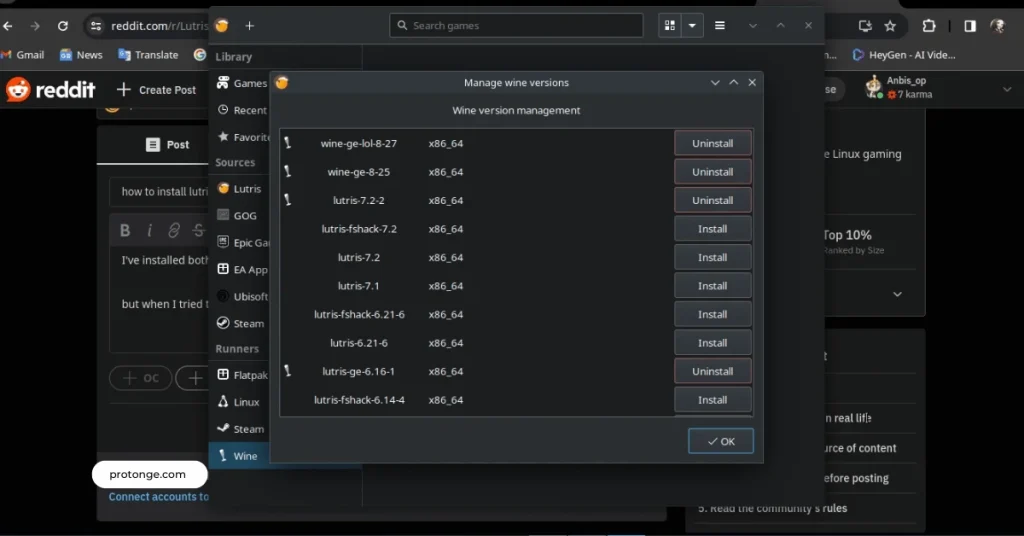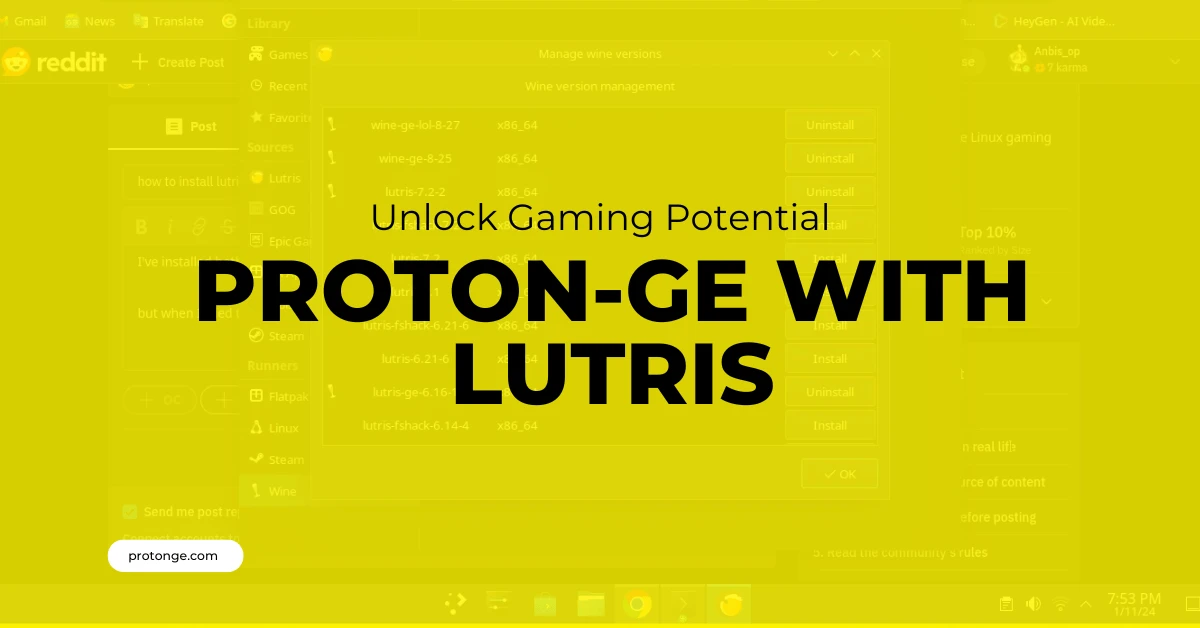Table of Contents
ToggleIntroduction
For many Linux gamers, Proton-GE with Lutris, Lutris acts as a hero, enabling the enjoyment of Windows games. But what if you could unlock even more compatibility and performance for those titles? Enter Proton-GE, a custom build of Proton that injects a dose of community-developed magic.
This guide will unveil the method to harness the power of Proton-GE with Lutris, taking your Linux gaming experience to the next level.
We’ll navigate two installation methods: utilizing the user-friendly ProtonUp-Qt tool and a more manual approach for experienced users.
Additionally, you’ll learn how to configure Lutris to leverage Proton-GE for specific games, ensuring you squeeze the most compatibility out of your favorite titles. Buckle up, Linux gamers, and get ready to witness the potential of Proton-GE with Lutris unleashed through Lutris!
Understanding Proton-GE: A Supercharged Compatibility Layer
Before diving into the world of Proton-GE with Lutris, let’s establish a solid foundation by understanding these powerful tools.

Proton: The Bridge Between Windows and Linux Gaming
Imagine a world where your vast library of Windows games seamlessly transitions to your Linux system. That’s the magic Proton brings to the table. Developed by Valve, Proton acts as a compatibility layer, essentially translating the instructions Windows games rely on into a language Linux understands. This allows a wide range of Windows titles to run directly on your Linux machine through Steam.
Proton-GE: Taking Compatibility to the Next Level
While Proton offers a fantastic solution for many games, there’s always room for improvement. Enter Proton-GE with Lutris, a community-driven project that takes the official Proton a step further. It’s a modified version of Proton that incorporates additional patches and tweaks developed by talented programmers within the Linux gaming community.
These patches target specific areas, aiming to:
- Enhance Compatibility: Certain games might encounter issues with the base Proton version due to missing functionalities or specific hardware interactions. Proton-GE with Lutris patches addresses these compatibility roadblocks, allowing previously unplayable games to launch and run smoothly.
- Improve Performance: While Proton strives for optimal performance, there’s always room for optimization. Proton-GE with Lutris patches might focus on graphics rendering, anti-aliasing techniques, or specific game engine interactions. This can lead to smoother gameplay and even higher frame rates for some titles.
- Address Specific Game Issues: The community-driven approach’s beauty lies in its focus on tackling problems encountered in particular games. Proton-GE with Lutris patches might be tailored to fix audio glitches, crashes during specific in-game events, or controller compatibility issues for certain games within your library.
The Synergy Between Proton-GE with Lutris
While Steam leverages Proton directly, Lutris offers a broader compatibility layer for running various Windows applications and games, not just those within the Steam ecosystem. By integrating Proton-GE with Lutris, you can extend the reach of these enhanced compatibility features to a wider range of your favorite Windows titles, even those not available on Steam.
Installing Proton-GE with ProtonUp-Qt (Recommended)
ProtonUp-Qt is a graphical user interface that simplifies managing compatibility tools like Proton-GE. Here’s how to install Proton-GE with Lutris using ProtonUp-Qt:
Obtaining ProtonUp-Qt:
There are two main ways to get ProtonUp-Qt:
- Using your distribution’s package manager: This is the easiest method. Search for “ProtonUp-Qt” in your software center or package manager. If available, install it like any other program.
- Compiling from source: This method requires some technical knowledge. You’ll need Git and Python 3 installed. Instructions for compiling are available on the ProtonUp-Qt GitHub repository: [Search ProtonUp-Qt GitHub ON github.com]
Installing Proton-GE for Lutris:
Once you have ProtonUp-Qt installed, follow these steps:
- Launch ProtonUp-Qt.
- Select “Lutris” as the target program. In the main window of ProtonUp-Qt, you’ll see a dropdown menu labeled “Target program”. Click on it and select “Lutris” from the list.
- Add a new Proton version. Click the button labeled “Add version” (it might have a plus sign icon). This will open a window showing available Proton versions.
- Choose the desired Proton-GE version. In the list of versions, look for entries that include “GE-Proton”. These are custom builds of Proton with improved compatibility. Select the specific version you want to install (e.g., GE-Proton7-42).
- Install Proton-GE. Click the “Install” button next to the chosen Proton-GE version. ProtonUp-Qt will download and configure the selected version for use with Lutris.
Configuring Lutris to Use Proton-GE
In Lutris, game settings can be adjusted to specify the use of Proton-GE. This involves editing the runner options for your game and selecting Proton-GE from the list of available compatibility tools. Configuration options vary, so adjusting them for optimal performance may require some experimentation.
Launching and Testing Games
With Proton-GE set up in Lutris, launching your game should now route it through Proton-GE’s compatibility layer. If you encounter issues, consider adjusting game settings or consulting the Proton-GE and Lutris communities for specific advice.
Advanced Tips and Considerations
Fine-tuning game settings can further enhance performance and compatibility. Additionally, keeping an eye on updates for both Lutris and Proton-GE ensures you’re benefiting from the latest improvements and fixes.
Conclusion: Proton-GE with Lutris
Integrating Proton-GE with Lutris can significantly improve the gaming landscape on Linux, making it a compelling platform for gamers traditionally tethered to Windows for its extensive game library. Experimenting with settings and staying involved with the community will help you get the most out of your Linux gaming experience.
FAQs
1. What is Proton-GE?
Proton-GE is a fork of Valve’s Proton project, enhanced with the latest game patches and compatibility fixes to improve gaming on Linux.
2. How do I install Lutris on Linux?
Lutris can be installed through your distribution’s package manager. For Ubuntu, for example, you would use sudo apt install lutris.
3. Where can I download Proton-GE?
Proton-GE is available on GloriousEggroll’s GitHub page, under the releases section.
4. How do I update Proton-GE in Lutris?
To update Proton-GE, download the latest version from GitHub and replace the existing Proton-GE directory in your Lutris compatibility tools folder with the new version.
5. Can I use Proton-GE for all my games in Lutris?
While Proton-GE is designed to improve compatibility for many games, some games may still perform better with the default Proton or other compatibility layers.
For more tips and guidance on managing your website, visit protonge.com. They offer great resources for website management and security.
Latest Post














